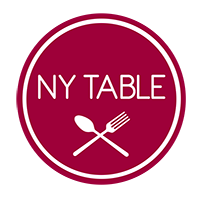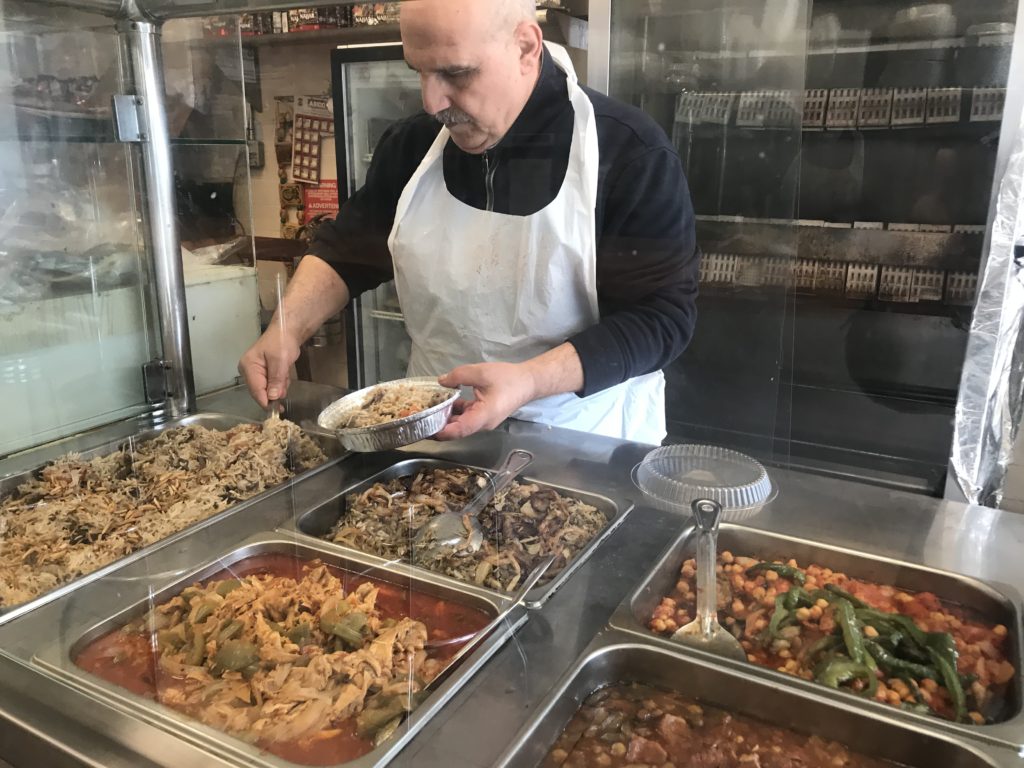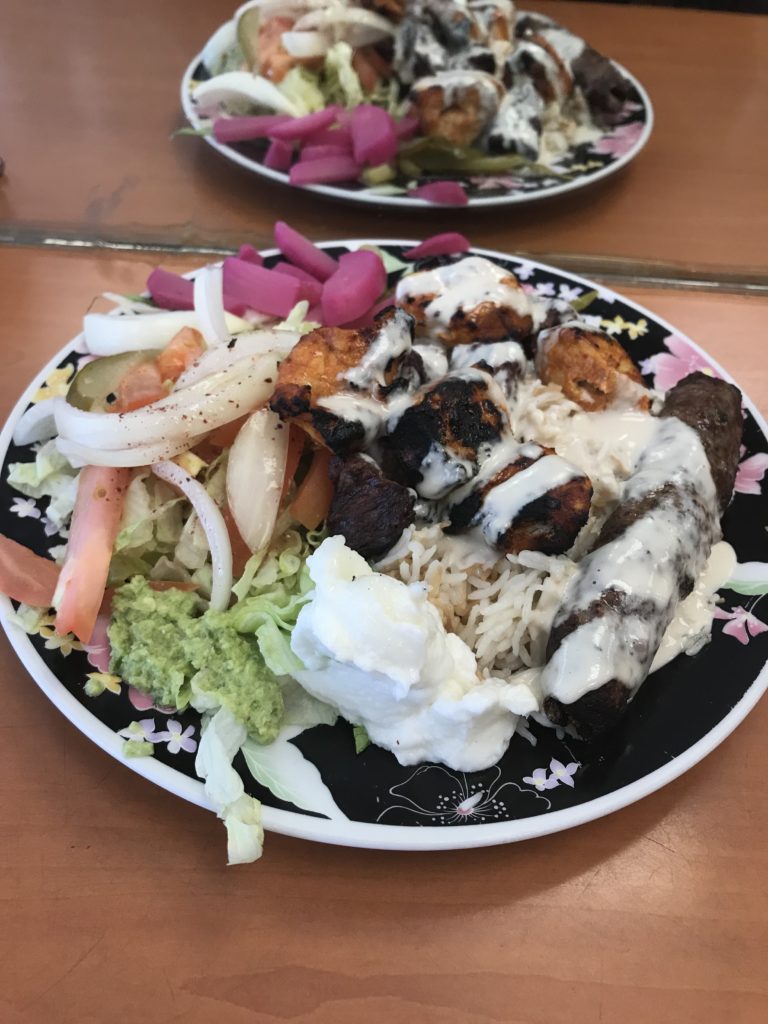At exactly eight every morning, Salwa Eljammal, matriarch of the Lebanese restaurant Souk El Shater in Sunnyside, Queens, unlocks the narrow storefront and clicks on the overhead lights as she shuffles towards the kitchen. A small woman with large, kind eyes, she’s barely begun preparing the ingredients for the daily lunch specials when customers begin filtering in from Queens Boulevard.
“I’ll tell you,” one customer said, with an impish grin, as he rushed out the door with a thyme pie in hand, “My wife is going to leave me because I eat here for breakfast and dinner every day!”
“We’re very well known in the neighborhood, the first Middle Eastern place to open and we’ve established ourselves part of the community,” said Hussein Osman, 28, while slicing tender pieces of chicken for a shawarma to go. Hussein and his younger brother Mohammad, 27, work for their parents behind the front counter while their mother guides the kitchen staff in the back.
Souk El Shater’s patriarch, Ahmad Osman, 56, emigrated from Lebanon with his wife in 1981 and entered “the food business was an accident,” he said, his voice warm and tinged with a slight accent. He originally took over his older brother’s smoke shop on 14th Street in Manhattan until a friend and business partner suggested renting a vacant space to start a new career in food.
According to a study by Restaurant Broker, an Arizona-based commercial real estate and brokerage firm, 90 percent of independent eateries close within the first year and the remaining 10 percent of businesses have an average lifespan of five years. Souk El Shater has endured for 25 years in Queens, and now the family is taking a leap of faith–this time nearly 2,500 miles, to Arizona.
“The game plan is to create a chain. It’s not just a one store and stop, we’re trying to really expand,” Hussein said, handing a small lunch plate to a waiting patron. The family will open its second restaurant near Arizona State University in Tempe, where the student population in 2016 was 71,946, almost double the population of Sunnyside, Queens.
The opportunity came about a year ago after friends involved in Arizona real estate proposed a deal: they’ll provide the shop if the Osmans provide the food. But the decision to go raised questions. Some of Hussein and his brother’s early memories are of spending time with their father in the restaurant. “On weekends he would pick either myself or my brother, and we’d spend the day with him in the store,” he said. In such a tight-knit family, it was hard to imagine how it would work.
“We took some time,” Hussein explained. “It took a couple months to think about it. Deciding who’s going to be the one to move out there. Who’s going to stay here, because we have a gem over here that we can’t let go.” In the end, Hussein would be the one to go while his family stays behind in Queens.
Ahmad understood that this could bring new opportunities and a better life for his son. “He would like to go over there because here life’s getting tougher and tougher. Our children are born and raised here so they like to have their own houses and, you know,” gesturing with his hands and shrugging a bit, “New York is very expensive.” Hussein mentioned that he and his wife are planning on having kids, and the high cost of New York makes starting a family difficult.
Both Ahmad and Salwa will be at the grand opening in Arizona, but Mohammad will stay behind to continue business at Souk El Shater. Of the two brothers, Mohammad is the one who spearheads the Queens shop and has for the last four years. “I have to hold it down, and in New York you can’t afford to just close for a couple of days,” he said.
“I think the biggest challenge over there will be to educate people about our type of food because Arizona is definitely not as diverse in New York City,” Hussein said. The Arab American Institute estimates around 20,000 Arab Americans live in Queens County, New York, compared to just over 30,000 living in all of Arizona.
Jeffrey Feghaly, a member of the Lebanese Student Association at Arizona State University, believes it’s very easy to find Arab food in Tempe because of the thriving Arab community. “There’s a lot of shops here because there’s a demand for it here,” he said.
Hussein, who’s already visited Arizona a handful of times and researched the area, is confident Souk El Shater can find its footing there. “There’s a lot of Middle Eastern students that transfer and international students, so they don’t have that halal option,” he said, referring to foods prepared according to Islamic guidelines. We’ll definitely be catering for them, but also our business is maybe 75 percent American.”
Hussein credits being a first-generation American for the mix of customers, saying “we’ve attracted a lot of American customers because we’re able to explain what our ingredients are in a way where it’s not intimidating to people that don’t normally eat this. So we’ll be able to cater to a very broad clientele.”
Mohammad’s approach is to let customers try the food first and to explain each dish by breaking down the recipe. “At the end of the day it’s ingredients you’re putting together. It’s just that they’re probably not used to the flavors,” he said.
In a rare moment of lunch-time calm, Hussein leaned against the counter to rest for a moment. “It’s more exciting than anything. At this point, this isn’t our first trial. We know what to expect in the business. We have a product that we know works,” he said.
At that moment, a tiny blonde woman hidden inside a puffy winter jacket breezed into Souk El Shater with a determined look on her face. “I came in yesterday and whatever I had was amazing,” she said, face pressed against the plexiglass protecting the food. “I think it was the grape leaves.” She left with a pound.
Tags: Arizona, Lebanese, Queens Food, Souk El Shater, Sunnyside

